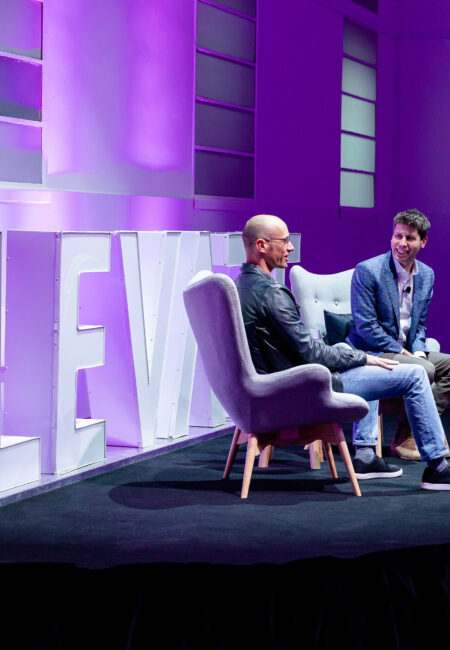By: Christine Andrew, May 29 2023
Canada’s exclusive OpenAI event hosted by Elevate on May 15 underlined the hottest topic facing businesses today: generative AI. OpenAI, the developer of ChatGPT, has earned viral-attention in workplaces around the world and the media for its innovative artificial intelligence tool. Sam Altman, OpenAI’s CEO, and Tobias Lütke, CEO of Shopify, provided valuable insights on the opportunities and potential impact of generative AI now and into the future. Watch their interview here.
A couple definitions before we dive in: generative AI is a type of artificial intelligence capable of generating text, images, and other media in response to questions or prompts. Generative AI models work by learning patterns in training data and then generating new data that has similar characteristics. ChatGPT is chatbot and form of generative AI that uses natural language processing.
As Managing Director at KPMG, here are my top five takeaways from the event:
1. The hype needs to be balanced with a gradual build
Altman highlighted the excitement surrounding ChatGPT’s launch, reaching millions of users within days. On launch day, it was clear in a few hours just how excited people were—and not only the early tech adopters. Five days after launch, they were up to one million users.
It’s clear that interest in generative AI has gone viral, however, we collectively need to continue learning, testing and evaluating the impact of artificial intelligence to understand its bounds and capabilities. At KPMG we do this by encouraging our clients to develop a comprehensive approach to ensure that the proper guardrails are in place for safe and responsible use of AI in their organizations.
2. Generative AI is a monumental human discovery
Altman believes we’re in a crucial period of significant human discovery and anticipates that this era will have a profound effect on the potential transcendence of human intelligence. Although it’s natural to feel some apprehension, it’s also important to remain open-minded to the possibilities. AI can be praised for its power to enhance effectiveness, as generative AI can act as a virtual assistant to help with productivity, for example. Altman also commented on the upside for scientific discovery. In essence, we should embrace a sense of excitement for a beneficial relationship between humans and AI. We rely on each other to provide the best possible outcome.
3. Regulations play a vital role, and we need to be ready
As AI rapidly advances, universally accepted guidelines are crucial. Similar to other technologies, AI requires regulation and oversight to mitigate potential risks. Altman is making headlines by advocating for AI regulations. Some of Altman’s recommendations include a government body for licensing large-scale AI models, safety regulations, and pre-release tests for public use. Firms like KPMG are well-versed in responsible AI, understanding and navigating regulatory complexity and are keenly attentive to ongoing developments with generative AI. Responsible AI can help protect organizations, employees, and customers from potential instances of misuse or unintended consequences. That’s one of the reasons KPMG sponsored this important conversation.
4. There’s been a multi-generational learning shift
It’s amazing to see how different generations use this tool. In the past, kids would dive into online research, going on captivating journeys to find what they wanted to learn. It was time-consuming and not always accurate. Now, with access to the internet, a basic phone and generative AI, knowledge is literally at your fingertips. Some tech leaders, including Altman, consider this a breakthrough in accessibility for customized learning. In theory, AI could influence a shift from fact memorization to critical thinking and more advanced problem-solving skills because information is becoming so readily available.
5. Humanity needs a dose of optimism
The ethical and responsible harnessing of AI can generate abundant positive outcomes, but Altman was quick to mention that AI has downsides that need to be monitored, managed and regulated. As Altman mentioned, we must regain our understanding of our capacity to effect positive change. He made an interesting comparison to historical developments, including the industrial revolution. During that period there was backlash and fear that jobs would go away, however, humanity persevered. Altman is optimistic that humans will adapt and evolve given the advent of generative AI as well as other emerging technologies yet to come.
What’s next?
Done right, we can harness the power of AI as a potent levelling agent, equalizing learning and unlocking unparalleled levels of productivity and efficiency. Let’s embrace this transformative technology and create a future where opportunity is abundant yet structured and managed. There is so much more to learn and we’re only scratching the surface.
If you’re interested in learning more about assessing your organization’s readiness for generative AI, KPMG is a great place to start: Empowering your enterprise with generative AI – KPMG Canada
This article is lightly edited and was originally written by KPMG before publication on elevate.ca.


